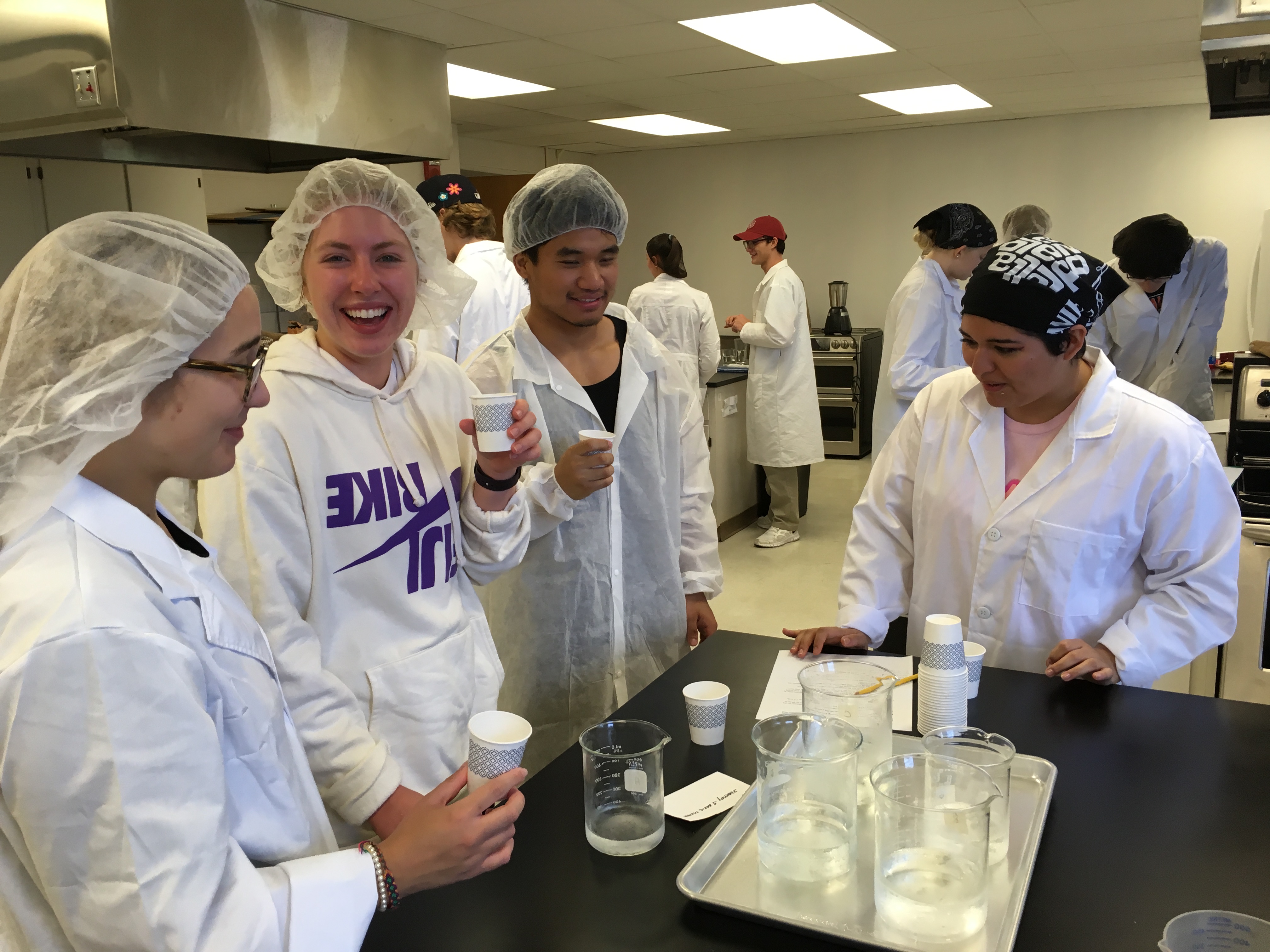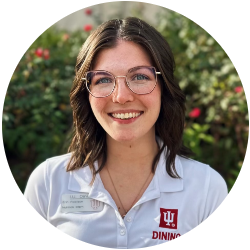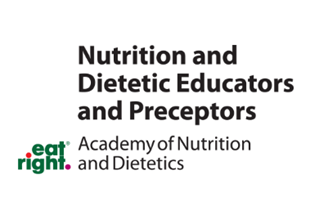With a major in dietetics, you'll gain a deep understanding of the connection between nutrition and health, as well as the ability to communicate about it effectively. This broad course of study, which promotes the health of individuals and communities, will prepare you to become a registered dietitian nutritionist (RDN). More than 95% of SPH-B dietetics alums pass the national Registered Dietitian (RD) exam within one year.
Preventing and treating disease through nutrition


"The dietetics major is for someone who loves science, serving others, teaching, and learning. The field of dietetics offers many different avenues and opportunities to find your niche. Whether it is clinical, food service, sports, community, public health, or research, you can find support to pursue your dreams at IU."
Erin Robison, B.S. in Applied Health Science - Dietetics
Getting Started
Dietitians educate people about what is best to eat for their individual needs. When treating patients and recommending food solutions, it’s important to understand ingredients and proportions. As a dietetics major, you will complete courses in nutrition science (including chemistry, biochemistry, physiology, and food science), medical nutrition therapy, food preparation, menu planning, communication, information technology, and management. You will apply what you learn in the classroom to hands-on laboratory and community experiences.
First-year coursework includes:
Introduction to Foods
This course examines the chemical and physical properties of food that influence food selection, handling, preservation and preparation, menu planning, and meal management. Students cook every week to learn more about food, how it can be altered, and how it impacts individuals.
Introduction to Public Health
Focuses on the rationale, history, and development of public health in the U.S. and globally. Emphasis on underlying theories, the scientific and social basis for public health practice plus the impact of critical public health concerns on society. Professional disciplines, organizations, and methods that interact to improve the public’s health are addressed.
Tracks and concentrations
The dietetics program is a pre-professional program designed to prepare you to become a registered dietitian nutritionist (RDN).
There are four steps to becoming an RDN:
- Complete a graduate degree (in any field of study).
- Most people will obtain a bachelor's degree first, followed by a graduate degree.
- A dietetics degree must be from an accredited university.
- Meet basic educational competencies established by the Accreditation Council for Education in Nutrition and Dietetics (ACEND).
- Complete a supervised practice experience through an ACEND-accredited institution.
- Take and pass the national RD exam.
Graduating from IU as an undergraduate dietetics major fulfills step 2 and prepares students for steps 1, 3, and 4. In addition, during your junior year, you may choose to pursue the Accelerated Pathway in Dietetics. The Accelerated Pathway combines the ACEND-accredited four-year undergraduate B.S. in Applied Health Science - Dietetics degree with a two-year M.S. in Applied Health Science - Nutrition degree. The result is a pathway that enables you to complete a B.S. and an M.S. degree in five years instead of the usual six years.
Upper-level coursework
Once you have acquired your foundational knowledge, you’ll transition into the professional core nutrition and dietetics courses, all taught by the nutrition and dietetics faculty. These courses are taken in a cohort model, so you’ll get to know your classmates and take these classes together. Upper-level coursework includes advanced nutrition courses and life-cycle nutrition. You’ll take what you learn and apply it in individual and community settings.
Our diverse faculty provide a wide range of expertise in teaching, research, and experience in the field. Take advantage of office hours to talk with your instructors about your performance in class, the content of assignments, and how the course helps you work towards your professional career goals. As a part of the School of Public Health-Bloomington, students can expand their interests beyond dietetics to the areas of fitness, health, epidemiology, and environmental health.
You'll gain practical, hands-on experience by participating in the Honors Program or working with IU faculty on research projects. And learning won't be confined to the classroom. Experiential and service-learning activities include food and food chemistry labs; nutrition counseling case studies and role-play; planning and preparing special event meals; designing a research project; and running a cooking class for at-risk youth.
Commonly pursued majors, minors, and certificates
With the help of your academic advisor, you may be able to combine several areas of interest with additional majors, minors, or certificates.
The Explore Programs tool can help you find majors, minors, and certificate programs that fit you and your goals by allowing you to filter by interest area. Other majors, minors, and certificates can be excellent opportunities to build upon and broaden your interests.
Some commonly pursued minors for dietetics students include exercise science, fitness instruction, environmental health, medical science, Spanish, psychology, personal well-being, and coaching.
Student groups
Explore beINvolved to connect with any of the 750+ student organizations that already exist or to start a new one. Student organizations that could fit your interest include:
Through the major
As a dietetics major, you’ll enhance your relationship skills by learning to provide care and support to best serve clients and customers. Many course topics and projects require you to build upon your communication skills through listening, writing, consulting, and presenting. The major will also help you gain management and leadership skills by setting goals, being organized, improving cultural sensitivity, and coaching others.
Skills desired by employers
Skills desired by employers and the profession include collaborating with healthcare teams, managing programs and services, consulting with others in the food industry, planning and implementing meal plans and programs, educating individuals, researching and problem-solving, evaluating health outcomes, communicating and promoting awareness, and an understanding of food science. Employers also seek employees who have had direct interaction with patients or clients.
Practicum, Fieldwork, and Internship Opportunities
Take the initiative to network and look for internship and job shadow opportunities as early as your first semester and every semester while pursuing your degree at Indiana University. Our fantastic Career Services Office supports students throughout the career search process.
With this major, you will be prepared to apply to graduate school and supervised practice to become a registered dietitian nutritionist (RDN). Graduate schools, internships, and employers appreciate applicants who have experience in the community. IU offers consistent on-campus student volunteer and work opportunities with IU Athletics and IU Dining and at off-campus sites such as local Boys and Girls Clubs, the Bloomington Community Orchard, Community Kitchen, and Hoosier Hills Food Bank.
You'll obtain the knowledge needed to apply to supervised practice or apply to graduate school to become an RDN. Other career possibilities include corporate wellness, sports nutrition, and food research and development. You'll be well-positioned to work in a variety of settings:
Clinical & community-based
RDNs may work in clinical settings such as hospitals, long-term care facilities, nutrition clinics, or private practice; serve on a health care team; or work one-on-one with people in the treatment and prevention of disease. Community-based RDNs counsel individuals and groups on nutritional practices designed to prevent disease and promote health.
Management
Management RDNs often oversee large-scale meal planning and preparation in healthcare facilities, schools, universities, restaurant chains, or private industries. A growing number of RDNs work in business, journalism, marketing, sports nutrition, and corporate wellness programs.
Research & education
Dietitians who enjoy research may prefer the food industry, where they can research and develop food products, services, or educational programs; or in major medical centers where clinical research is conducted. With advanced degrees, dietitians may pursue careers in dietetics education.
Explore our Health & Human Services to learn more about career options and outcomes.
Introductory classes typically have 50–80 students; lab sections 20 students; and upper-level courses have an average class size of 20. Dietetics is a great major for students who want to help others and are interested in learning how food impacts individuals and their health. The most successful students are those who think critically, have strong communication skills, and are motivated and organized. Students who excel in the program have good foundational knowledge in the sciences and have an interest in health education, health promotion, and disease prevention and treatment.
Ready to major in dietetics? Learn more about how to join the School of Public Health-Bloomington.
The Indiana University Didactic Program in Dietetics is currently granted accreditation status by the Accreditation Council for Education in Nutrition and Dietetics of the Academy of Nutrition and Dietetics,
120 South Riverside Drive, Suite 2290, Chicago, IL 60606, 312-899-0040, ext. 5400


"The foundation I built while enrolled in the dietetics program has shaped me into a proficient registered dietitian. I feel confident in my responsibilities, including leading nutrition counseling sessions with individuals and families. The comprehensive curriculum and hands-on practicum prepared my peers and me to navigate several career paths, whether in a medical hospital, community nutrition program, university, or a specialized field like eating disorder treatment, corporate wellness, athletics, or food service management."
Ashley Butler, RDN
Inpatient Adolescent Eating Disorder Program Manager
Fremont Hospital

